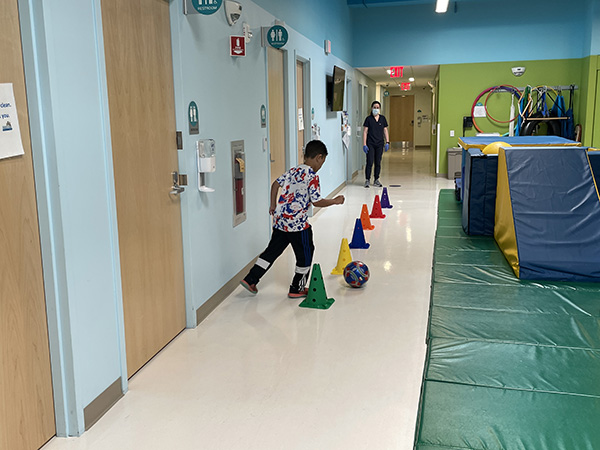
About Pediatric Concussions
In 2022, it is estimated that 2.3 million children and adolescents received
a diagnosis of concussion/mild traumatic brain injury, with nearly 70%
of those cases due to sport and recreational activities. Current literature
has demonstrated the importance of early diagnosis/management, referral
to concussion care specialists, and multi-disciplinary treatment, especially
in the pediatric population. This early and comprehensive post-concussion
management can help ensure safe/successful return to learn and play.
Why Seek Out Post-Concussion Rehab?
Current literature has emphasized how important timely management and active
recovery are for individuals’ post-concussion. This is especially
important for a young, developing brain. In addition to the individualized
treatment and ongoing monitoring, post-concussion rehab also includes
extensive family education and the development of a structured home program
to promote a safe return to school and sport/activities.
Comprehensive Concussion Care at CSH
At Children’s Specialized Hospital (CSH), each child will always
receive individualized and 1-1 treatment using the most up-to-date and
evidence-based interventions to promote a safe and efficient return to
school, sport, and community/recreational activities. Clinicians at CSH
specialize in pediatrics, understanding the need to make therapy meaningful
and fun to keep each child engaged and get the most out of their therapy
sessions. Clinicians often collaborate with other disciplines to best
address the needs of each child and offer multidisciplinary care (as appropriate).Whether
the activity is baseball, football, soccer, dance, basketball, or just
playing on the playground, we are always excited to get to team up with
each child and the family to help them successfully return to the activities
they love.
To promote efficient recovery, the child may work with a variety of disciplines
(depending on their symptoms), which may include:
Physical Therapy,
Occupational Therapy,
Speech & Language Therapy,
Psychology (when available), and/or
Neuropsychology (when available).
Physical Therapy:
In
outpatient physical therapy (PT)
at CSH, skilled physical therapists will perform a thorough evaluation
to assess each child’s current function and identify areas of focus
for treatment. Common post-concussion symptoms addressed during the PT
evaluation may include headaches, dizziness, difficulties with balance,
neck pain, blurred vision/visual concerns, fatigue, etc. Treatment will
be individualized and tailored to the specific child and the child/family’s
goals. Activities may include aerobic/cardiovascular exercise, vestibular-ocular
interventions, balance training, postural and neuro-muscular re-education,
cervical mobility/stability, manual therapy, sport-specific exercises,
dual-task activities, etc. There will also be a strong emphasis on patient/family
education and development of an individualized, prescriptive home program
tailored to each child. Each child will complete standardized post-concussion
protocol pending symptom resolution to ensure safe return to play/sport.-
- PT Commonly Addressed Areas: Cervical Spine Mobility/Pain Reduction, Vestibular-Ocular
Function, Cardiovascular/Endurance Training, Visual-Motor Functioning,
Dual-Task Training
Speech Therapy:
In
outpatient speech therapy
at CSH, skilled speech-language pathologists evaluate the impact of concussion
symptoms on cognitive skills associated with day-to-day activities pertaining,
but not limited, to attention, focus, memory, judgment, and planning.
These professionals work with both the patient and the family to tailor
specific treatment plans that can improve daily functioning via combination
of learned strategies for executive functioning and symptom management.
Skilled sessions are created to reflect naturalistic scenarios for generalization
and also incorporate opportunities for family education to promote improved
carryover across all functional settings.
- SP Commonly Addressed Areas: Executive Functioning, Processing, Memory
and Recall, Word Finding, Cognitive Fatigue
Occupational Therapy:
In
outpatient occupational therapy (OT)
at CSH, skilled occupational therapists perform evaluations and tailor
treatment to assist clients with improving their performance in everyday
tasks, also known as occupations. Following a brain injury, daily life
tasks such as self-care, sleep, and academic/work performance can be interrupted
and challenged. Occupational therapists assist with improving skills,
adapting the environment, and modifying tasks to improve overall participation.
In addition, OT’s assist with building routines and habits that
will help support overall wellbeing and health. Some specific areas or
skills that OT’s might address during concussion recovery include:
visual processing skills, sensory processing, coordination and balance,
and sleep/fatigue management. Similarly to all therapies provided, OT
goals will be client centered, family based, and a strong emphasis on
education ad home carry over will be emphasized.
- OT Commonly Addressed Areas: Executive Functioning, Sensory Processing,
Visual Motor/Perceptual Functioning, Sleep Management, Fatigue Management
& Energy Conservation, Modifying Daily Activities
When to Seek Post-Concussion Care at CSH
The sooner the better to promote a more efficient recovery and safe return
to sport/play! If a child is experiencing any of these symptoms following
a concussion, they may benefit from a comprehensive evaluation to determine
the appropriate treatment:
- Headache
- Balance Problems
- Dizziness
- Blurred Vision/Visual Concerns
- Sensitivity to Light/Noise
- Neck Pain
- Nausea or Vomiting
- More Emotional
- More Irritable
- Sadness
- Nervous or anxious
- Difficulty Concentrating
- Difficulty Remembering
- Feeling Slowed Down
- Feeling like “in a fog”
- Sleeping less than usual
- Sleeping more than usual
- Trouble falling asleep
To schedule an appointment, call
888-244-5373 or click
here to request an appointment.
link

